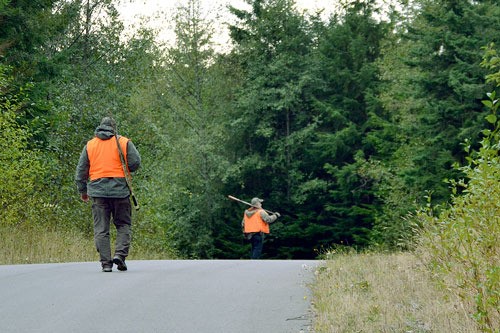Most of the i’s have been dotted and the t’s crossed, and the Whidbey Camano Land Trust is ready for feedback on its draft of the Trillium Community Forest management plan.
A public workshop will be held at 6 p.m. Wednesday, Oct. 24 at the Unitarian Universalist Congregation of Whidbey Island, 20103 Highway 525, Freeland.
“We wanted to make sure the entire community was represented and also that when we had a working document, it covered as many aspects as possible,” said Jessica Larson, a Land Steward with the Land Trust.
According to Larson, the Land Trust has spent a year working on the plan, listening to public input and meeting with focus groups and steering committees to try to find the balance the Trust feels is necessary to achieve between recreation and preservation.
“We’re looking for substantial community input that we can work with to improve the plan,” she said. “My hope is that everyone will read it.”
The draft management plan is available for review on the Trust’s website, www.wclt.org. Larson said she doesn’t expect there will be any surprises in the document, because they tried hard to cover every conceivable issue.
Even the fact that the Trust is allowing deer hunting on the property isn’t anything new. This is the second year hunting has been allowed to help control the black-tailed deer population.
“When we decided to allow hunting, we did it very carefully,” Larson said. “We talked to all the hunting groups, those opposed as well as those in favor and we feel we were able to come up with a reasonable plan that we have rolled out slowly.”
Currently deer hunting is allowed on the property about 42 days of the year, which is a little under half of the length of the regular hunting season. Larson said hunting with modern firearms is allowed early in the season while archery is allowed later, both receiving an equal number of days.
In terms of goals the Land Trust would like to accomplish, the first on the list of recreational aims is establishing parking areas that would allow disabled access to the community forest’s system of trails. The group would also like a parking area that would accommodate horse trailers. Those projects will be prioritized as funding and grants become available.
Preserving the Trillium Community Forest remains the top priority for the Land Trust. About 450 acres of the land was clear-cut by the Trillium Corporation in 1990 and was replanted with Douglas fir with future logging in mind. As a result, there are 400 to 600 trees per acre, which is far too dense, according to Larson.
“When there are that many trees it affects the forest’s understory,” she said.
The understory is made up of shrubs, grass and small trees. But when the trees grow too thick, light can’t penetrate the trees’ canopy and the understory is choked off. Insects, song birds and small mammals who live in the understory are forced to move. Trees fight for space and water, becoming stressed.
“Nature can fix itself,” Larson said. “But that leaves the trees, which are already stressed, more susceptible to disease and we definitely don’t want that to happen.”
The optimum number of trees per acre is about 120, so the Land Trust has begun a series of restoration thinning operations to open the canopy and give the trees and the understory a chance to grow. They can’t reach that goal all at once, so the thinning will be done a little at a time. In all, the thinning will take anywhere from 30 to 50 years to complete, according to the management plan.
“We’re giving nature a little push, which gives us a good chance to see how the forest responds,” Larson said. “We take people out to show them what the forest looks like before thinning and then the difference after thinning. They have a pretty visceral reaction.”
Larson said she thinks it should be obvious that the Land Trust’s intent is to collect land for preservation, not for development.
“We’re investing in our future,” she said. “Future generations will be able to see how nature can work in a large scale setting. People can see how even young forests become more complex.”
Larson encourages those who can’t attend the workshop to read through the management plan and email any questions or comments to her at jessica@wclt.org.



